
Muslim Muhammad oghlu Magomayev, dubbed the "Soviet Sinatra", was a Soviet and Russo-Azerbaijani opera and pop singer. He achieved widespread recognition throughout Russia and the post-Soviet world for his vocal talent and charisma, including a People's Artist of the USSR award in 1973.
![<i>Moscow Does Not Believe in Tears</i> 1980 [[Soviet Union]] film](https://upload.wikimedia.org/wikipedia/en/a/a3/Moscow_for_US.jpg)
Moscow Does Not Believe in Tears is a 1980 Soviet romantic drama film made by Mosfilm. It was written by Valentin Chernykh and directed by Vladimir Menshov. The leading roles were played by Vera Alentova and Aleksey Batalov. The film won the Academy Award for Best Foreign Language Film in 1981.

The Irony of Fate, or Enjoy Your Bath!, usually shortened to The Irony of Fate, is a 1976 Soviet romantic comedy television film directed by Eldar Ryazanov and starring Andrey Myagkov, Barbara Brylska, Yury Yakovlev and Lyubov Dobrzhanskaya. The screenplay was written by Emil Braginsky and Ryazanov, loosely based on the director's 1971 play, Once on New Year's Eve.

Alla Borisovna Pugacheva is a Russian singer and songwriter, actress. Her career began in 1965 and continues to this day, although she retired from performing in 2010 after the international concert tour "Dreams of Love". For her "clear mezzo-soprano and a full display of sincere emotions", she enjoys an iconic status across the former Soviet Union as the most successful Soviet performer in terms of record sales and popularity. For several decades, Pugacheva was a sex symbol, a style icon, an inspiration for Soviet women and a heroine of Russian tabloids. In the media, Pugacheva has been called "the Queen of Russian pop music". Pugacheva is one of the few Russian performers who has achieved international success, along with Anna Netrebko and t.A.T.u.
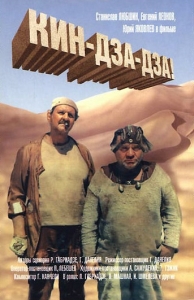
Kin-dza-dza! is a 1986 Soviet film released by the Mosfilm studio and directed by Georgiy Daneliya, with a story by Georgiy Daneliya and Revaz Gabriadze. It is a dystopian science-fiction black comedy, in which two men from Earth accidentally travel through space, meeting two aliens from the Kin-dza-dza star system and their post-apocalyptic world.
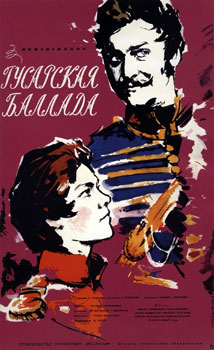
The Hussar Ballad is a 1962 Soviet musical film by Eldar Ryazanov, filmed on Mosfilm. In effect, it is one of the best loved musical comedies in Russia.

Stanislav Andreyevich Lyubshin is a Soviet and Russian actor, film director, and People's Artist of the RSFSR (1981).

Yury (George) Chernavsky is a Russian producer, composer and songwriter. Chernavsky is a member of performance rights organisations such as GEMA, BMI, and RAO, and has also been recognized as an Honored Artist of the RSFSR.

Oleg Ivanovich Borisov was a Soviet and Russian stage and film actor. People's Artist of the USSR (1978).

Oleg Nikolayevich Yefremov was a Soviet and Russian actor and Moscow Art Theatre producer. He was a People's Artist of the USSR (1976) and a Hero of Socialist Labour (1987).

Tovstonogov Bolshoi Drama Theater, formerly known as Gorky Bolshoi Drama Theater (1931–1992), often referred to as the Bolshoi Drama Theater and by the acronym BDT, is a theater in Saint Petersburg, that is considered one of the best Russian theaters. The theater is named after its long-time director Georgy Tovstonogov. Andrey Moguchy was the artistic director of the theater in 2013–2023 years.

Alexander Borisovich Zhurbin, born in Tashkent, Uzbek SSR, on August 7, 1945, is a prolific Russian composer. His first success came in 1975 with a rock-opera, Orpheus and Eurydice, which had 2000 consecutive performances in the former Soviet Union. He has composed scores for over 50 feature films and 40 musicals. He also has worked on multiple musical pieces including opera, musicals, symphonies and movie soundtracks. His songs have been performed by famous artists from Eastern Europe, such as Russian pop icon Alla Pugacheva, and Estonian singer Jaak Jola. Zhurbin is a laureate of the Ovation Award in the Living Legend category.

Oleg Frish is a Russian entertainer, singer, actor, television and radio personality, journalist, music historian, and is the Owner of New Age Media. Oleg was born in Zaporizhia, USSR into a family of musicians. His mother, Svetlana Frish, is a pianist and his father, Eugeny Frish, was longtime head of the children’s choir and an important member of the artistic community.
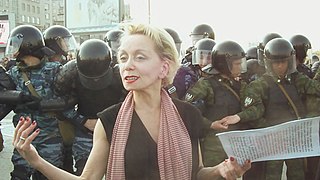
Evdokiya Germanova is a Russian actress, stage director and drama teacher.

Higher Than Rainbow or is a 1986 Soviet television musical film directed by Georgi Yungvald-Khilkevich.
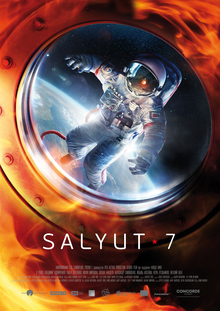
Salyut 7 is a 2017 Russian disaster film directed by Klim Shipenko and written by Aleksey Samolyotov, the film stars Vladimir Vdovichenkov and Pavel Derevyanko. The story is based on the Soyuz T-13 mission in 1985, part of the Soviet Salyut programme; it was the first time in history that a 'dead' space station was docked with, and brought back into service.

Alla Zinovievna Budnitskaya is a Soviet and Russian actress of theater and cinema.
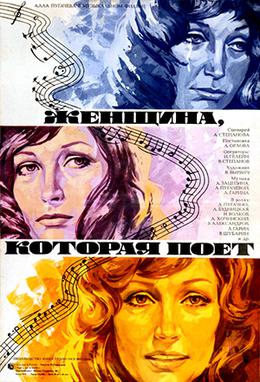
The Woman who Sings is a 1978 Soviet film by Aleksandr Orlov. It is a musical melodrama and fictionalized biography of Alla Pugacheva, where the heroine is represented by Anna Streltsova.

Leto is a 2018 Russian musical film directed by Kirill Serebrennikov that depicts the Leningrad underground rock scene of the early 1980s. The film draws loosely from the lives of the Soviet rock musicians Viktor Tsoi and Mike Naumenko. It was selected to compete for the Palme d'Or at the 2018 Cannes Film Festival, where it won the Cannes Soundtrack Award. Leto also won the Best Production Designer at the 2018 European Film Awards.
Adolf Yakovlevich Shapiro is a Soviet, Latvian and Russian theater director, acting teacher, playwright and author. People's Artist of the Latvian SSR (1986), Merited Master of the Arts of the Russian Federation (2019), Laureate of the State Prize of the Latvian SSR (1987).


![<i>Moscow Does Not Believe in Tears</i> 1980 [[Soviet Union]] film](https://upload.wikimedia.org/wikipedia/en/a/a3/Moscow_for_US.jpg)
















